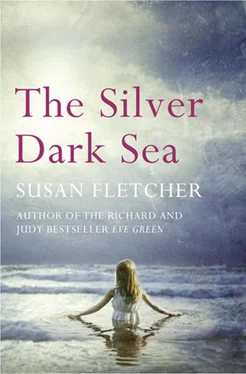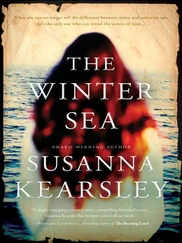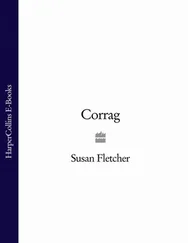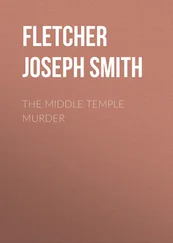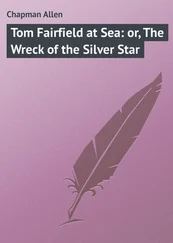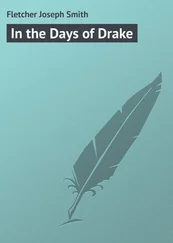Nearly four years .
He glances down at Sea Fairy . Her green tarpaulin is streaked with gull droppings. She bobs in the corner – old, unloved.
* * *
The sun is high and white. The grass is shining. Laundry is pegged on washing lines.
All the colours seem bright, as Nathan drives. He squints at the school’s roof, at the glossy tail of the rooster at Wind Rising, at the ragwort sprouting in the lane. Even the lighthouse’s paintwork seems brighter to him so that he reaches up for the car’s visor and tilts it down. Has there been a hotter day than this, this year? He doesn’t think so. He drives slowly, with his window down. His right forearm rests on the door and he can hear the long grass brushing the underside of his car. Once he’d have loved this weather. He’d have taken beers into the fields or left them in a rock-pool to cool, as he swam. Or he’d have taken a rug up to the lighthouse and the northern coast and spent the afternoon there – him, and Kitty.
A ewe treads in front of him.
One of mine . Nathan knows this. He knows his own, amongst Ian’s; they are Texel, firm-bodied with blue tags in their ears. They are trickier to shear in that they’re strong beasts, and two weeks ago he’d had to kneel hard on their ribs and tie their hind legs as he’d sheared them. Shearing … It’s in the Bundy blood. Ian, Hester and Nathan could all handle shears before they learnt to ride bikes or to add and subtract. They knew how to catch a sheep, drag it back and grip it tightly between their thighs before they knew how to spell Cantalay or Merme . Tom was the exception. He’d shear, but he’d have one eye on the water. Nathan grew strong from hauling sheep and mending fences; Tom’s arms thickened from lobstering, from pulling on the cord to start the outboard motor, from rowing into hidden coves.
Are you sure he’s one of ours? Their father said this, once. We’re land folk, not sea.
Nathan glances to his right.
Crest is coming into view. He sees its yellow guttering, its matching yellow door. This is the island’s highest point – the whole coastline can be seen from its driveway, from Litty in the south, round to Bundy Head. The house had been derelict, once. Once, it had been four stone walls with a leaking roof and the brown streaks of sheep urine on the skirting boards. But it was always the best position to live – the height, the views. Nathan remembers ducking through it as a child and feeling how a king in his castle must have felt – alive, amazed, buffeted by wind. Tom, also, felt that. When he was twenty-four he’d said, do you know what I’m going to do? For six summers he worked on that house. He’d hammered, hauled and rung friends on the mainland; he’d buy beers for his brothers before saying, you couldn’t help me with …? He made Crest a home again. And what a home – with bookshelves made of driftwood, curtains hung on lengths of rope, a septic tank, a compost heap, a chair forged out of wooden crates, a single solar panel as dark as a burnished eye. There was the chalky knot of whalebone Tom used to prop open the door. And the kitchen table had been part of a fishing boat, once; her name, Coralee , still hangs on the staircase. Nathan has seen it.
Tomato plants, too. Those were Maggie’s addition. The porch is south-facing and she’s filled it with them so that Nathan knows how the porch will smell today, when he enters it – the sharp fruit, the trapped heat.
He turns right, along its driveway.
Crest. He loves it and it saddens him – both.
He turns off the engine. There is a sudden hush, and he wonders what he will tell her, what words he will use and if they will be the right ones.
She appears. She steps out of an outbuilding, into the light. She holds a tin of yellow paint which is dripping down its side. Yellow paint on her arms and hands. Maggie looks up.
She smiles: hey.
Nathan shuts the car door. He comes so close that he can see she has yellow paint everywhere – on her cheeks, her nose, her collarbone. Her hair is tied back but one strand is loose and is blowing across her face so that it makes her blink, and the tip of it is yellow. There is the smell of sheep and fresh paint and Maggie’s washing powder and as a cloud’s shadow passes over them he thinks, briefly, how beautiful it is – to be standing here.
Nathan?
He doesn’t want to tell her. Just passing.
She eyes him. Liar , she says.
Maggie feels afraid. No-one is ever just passing – and not Nathan, of all people. Nathan, who tends to leave her be.
A strand of hair is fluttering, but she does not reach for it. Tell me.
A man’s been found. Washed up.
Washed up? From the sea?
He nods.
Alive?
Yes. He’s at Tabitha’s.
Is it –?
No. No, it’s not.
She tries to put the paint tin down, but it tilts, and spills, and he comes forward saying careful. I’ve got it. Here – give it to me.
* * *
Nathan leads her inside. He knows her house, and he knows to duck slightly as he steps into the kitchen, under the doorframe and the hanging copper pans. She walks with her hands held in front of her, as if walking in the dark.
Sit down.
It’s not Tom?
No.
Maggie hears the small hesitation, looks up.
For one small moment, I … Nathan shrugs. He looks a bit like him.
Dark?
Yes. And the beard. And he’s big – tall, broad …
But not Tom?
Not Tom.
You’re sure? Her eyes are round. They are like the stones that come ashore, the stones that have been rolled and rolled through the years, thrown against other stones. They are grey, with a navy edge.
Mags, I promise. This man is not him.
They sit side by side, at the table that used to be Coralee . Maggie runs her fingers over her lips. Who is he, then?
We don’t know yet. He’s still sleeping.
Where was he found?
Sye. He was lying on the stones. Sam found him. He came to Wind Rising for help and we carried him.
To –?
Lowfield.
She considers this. She takes a deep breath, releases it slowly. OK. Well … Tom never liked it – Sye. Said it was dank, hard to walk on. If he was going to wash up, he wouldn’t wash up there.
It is a half-joke; they are nervous words.
Is he hurt?
No. Doesn’t seem it.
Does Emmeline know?
Yes.
He watches Maggie. She says nothing for a while. There is a single crumb on the table, and Nathan watches her as she places her forefinger on it, rolls the crumb from side to side. Left and right. You came here because you knew people would talk. It is not a question.
You know how it is here.
She says yes I know.
He cannot think of anything to say. There is nothing to say to her that he has not said before, or tried to say, and so he sits, scans the room that they are sitting in – the spotted oven gloves, the chopping board with an apple core on it, the ferry times on the noticeboard. There are shells everywhere – cockles, whelks, a purple-tipped sea urchin on the windowsill. Beside it there is a vase of feathers with sand still on them, feathers whose blades have torn or split. Maggie the forager. She is always looking – but aren’t they all? His eyes settle on a photograph. It is held to the fridge with magnets and it is of Nathan’s younger brother and Maggie; they are wearing anoraks, with their faces pressed together, cheek to cheek. Tom’s arm is in the foreground, leading to the camera – he was taking the photo himself. A bright, blustery day.
Читать дальше
